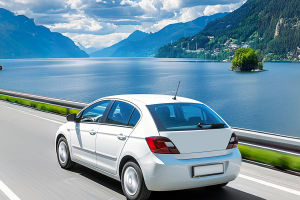You probably don't think much about your car's suspension—until you hit a pothole the size of a pizza box. Then, suddenly, you care a lot about what's keeping the ride smooth.
For luxury car buyers, suspension systems aren't just about comfort; they define how the car feels every second you're behind the wheel. And while every premium brand claims their setup is "the best," the reality is more nuanced.
Let's dive into how different advanced suspension systems work, and more importantly, how they actually affect the driving experience in everyday conditions.
Air Suspension: The Cloud-Like Ride
Brands like Mercedes-Benz (AIRMATIC) and Audi (Adaptive Air Suspension) have refined air-based systems that replace traditional steel springs with pressurized air chambers. The key benefit? Adjustable ride height and stiffness at the push of a button.
• Mercedes AIRMATIC: Known for its floaty, almost limousine-like comfort, it soaks up imperfections incredibly well at cruising speeds. But, it can feel slightly disconnected in sharp corners, prioritizing plushness over driver engagement.
• Audi's setup: Still comfortable, but tuned with a touch more firmness to keep body roll in check. This makes it feel more stable during highway lane changes without sacrificing too much cushioning.
Air suspension shines in urban and long-distance comfort, but tuning philosophy determines whether it feels soft or sporty.
Adaptive Dampers: Precision Comfort
BMW's Adaptive M Suspension and Lexus's Adaptive Variable Suspension (AVS) both rely on electronically controlled dampers that adjust in milliseconds based on road conditions and driving style.
1. BMW Adaptive M – Even in Comfort mode, there's a subtle firmness that transmits a little more road texture, which driving enthusiasts often love. It balances comfort with agility, making it feel planted on winding roads.
2. Lexus AVS – Calibrated for serenity, Lexus keeps the edges of bumps softened. The system reacts quickly, so even expansion joints on highways feel muted.
If you want a "driver's car" without sacrificing all-day comfort, adaptive dampers often strike the sweet spot.
Hydraulic Active Suspensions: The Curve Master
One standout is Mercedes' E-Active Body Control—a tech showpiece that uses a combination of air springs and hydraulics to counteract body lean. The result? On twisty roads, the car leans into corners like a motorcycle, keeping passengers level.
It feels remarkably flat over bumps or during aggressive cornering. The trade-off: complexity and cost. This type of system is typically reserved for top-tier models because of its maintenance demands.
Real-World Comfort Comparisons
Testing these systems on the same bumpy suburban route revealed:
• Air suspensions: Best at absorbing deep potholes and speed bumps, especially at low speeds.
• Adaptive dampers: Superior at blending comfort and control, ideal for varied driving.
• Hydraulic active systems: Most impressive for handling + comfort combined, but overkill for purely city driving.
Comfort perception is as much psychological as mechanical. Some drivers prefer to feel slightly more road feedback, while others want complete isolation.
What This Means for Buyers
If you're shopping in the luxury space, think about where you actually drive:
• Mostly city driving? Air suspension may give you the most noticeable comfort upgrade.
• Mix of highway and twisty backroads? Adaptive dampers could be your perfect middle ground.
• Frequent mountain or scenic drives? Hydraulic systems will wow you—if your budget allows.
The next time you're in a luxury dealership, skip the sales brochure jargon and ask to test the suspension modes on real roads, not just a smooth showroom lot. After all, it's not about which brand claims the crown—it's about which system makes your daily drive feel effortless.
If you had to choose, would you want your car to glide over bumps like they're not there, or give you just enough feedback to feel connected to the road?


